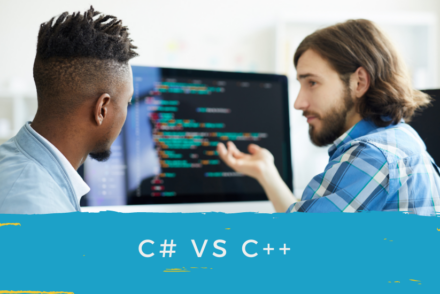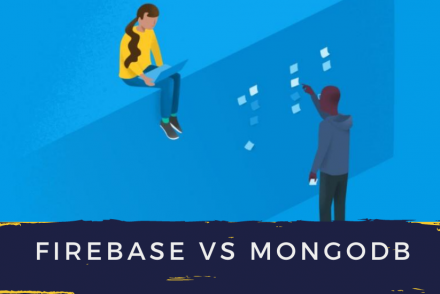Programming languages are the foundation of web development. They provide guidelines for writing code and determine what you can and cannot do. As a developer, it’s important to understand the nuances and differences between programming languages. Two of the more popular languages are JavaScript vs PHP.
Main Differences Between Javascript vs PHP
The main differences between Javascript vs PHP are:
- JavaScript is a client-side scripting language, whereas PHP is a server-side scripting language.
- JavaScript is faster than PHP because it’s event-driven, whereas PHP is slower because it’s synchronous.
- JavaScript code on the browser putting your website at risk of security breaches, whereas PHP hides its code on the client browser which makes it more secure
- JavaScript executes its code within the browser, whereas PHP executes its code on the server.
- JavaScript is an Object-Oriented Programming (OOP) language, whereas PHP is a procedural language.
- JavaScript is case-sensitive, whereas PHP doesn’t discriminate lower case or upper case letters.
- JavaScript is an object-oriented language which makes it hard to learn, whereas PHP is a procedural language much easier to learn.
- JavaScript is a more universal language made possible by JS ecosystems like Node.js, whereas PHP is made specifically for the web through its architecture.
- JavaScript is an open standard language maintained by the ECMA, whereas PHP is an open-source language which means developers can edit and change the code to their liking.
Similarities Between JavaScript and PHP
Both JavaScript and PHP are object-oriented languages used to create dynamic websites. Instead of having to write HTML, developers can use both languages as a faster alternative.
Below are some additional similarities between JavaScript and PHP:
- Both JavaScript and PHP code can be written in plain text using a standard text editor.
- There is no need for complicated compilers to run the language scripts.
- Since there are no compilation requirements, you can quickly test both languages on live websites.
- The languages are flexible; you can write short, simple scripts or long, complicated ones.
- Both languages use functions like conditional statements like “if” and loops.
- JavaScript and PHP are both interpreting languages that execute code on the client and server, respectively. In addition, both languages require HTTP requests to render pages.
- Memory management is a big part of both languages. Closures in JavaScript and Garbage Collection in PHP are how both languages manage memory without disrupting the user’s experience.
So Which is Better: JavaScript vs PHP?
The main difference between JavaScript and PHP is that JavaScript is a client-side scripting language while PHP is a server-side scripting language.
This difference means that JavaScript code runs on the user’s computer (or client), and the client’s web browser interprets the code. On the other hand, PHP runs on the web server and sends the code to the user’s browser as plain HTML.
This article will further go into detail about the differences and similarities between JavaScript and PHP. You will learn how these two scripting languages can work together and ultimately choose the better one for your next project.
What is PHP?
PHP (Hypertext Preprocessor) is an open-source server-side scripting language for creating dynamic web pages. PHP manages dynamic web content, allowing users to interact with server scripts and databases like MySQL, Oracle, and Microsoft SQL Server.
The PHP scripting language is one of the most popular programming languages, powering more than 78.2% of websites with a known server language.
Core Features of PHP
PHP is built on a basic set of core features. It doesn’t have classes or objects like other programming languages, but it does offer the following:
- Open source: PHP is an open-source scripting language. You don’t need to pay any licensing fee or royalties to use PHP.
- Ease of use: PHP is straightforward to use. It uses a command-line interface and has a simple syntax that even novice developers can understand.
- Database support: Leading databases such as MySQL, Oracle, and Microsoft SQL Server can easily integrate with PHP.
- Security: PHP has built-in security features and can even prevent SQL injection attacks. It also does not display or pass HTTP headers, so developers can also avoid cross-site forgery attacks.
- Control: You don’t need long lines of code to command PHP. It’s easy to use and requires small amounts of code.
What is JavaScript?
JavaScript is a client-side scripting language that adds interactivity to web pages. It’s an object-oriented language that runs on the user’s computer (client).
The web browser executes the JavaScript code, making it easier for web developers to design websites with animations, games, user interaction, and other dynamic features. Data from W3techs indicates that more than 97.6% of all websites use JavaScript.
Core Features of JavaScript
JavaScript is built on a basic set of core features. It’s easy to learn and offers the following:
- Object-oriented: JavaScript is an object-oriented language that uses variables, methods, statements, and expressions. This coding style allows developers to create objects with properties and functions.
- Ease of use: JavaScript syntax is straightforward and uses common commands like var, for, if, while, and others. This makes it easy to use for web developers.
- Client-side: As previously discussed, JavaScript runs on the user’s computer (client). This makes it great for dynamic web pages with animations, games, and interactivity.
- Interpreter-centered: A common interpreter known as the JavaScript engine is required to run programs.
- Lightweight: JavaScript does not require an external library or module to run.
- Case sensitive format: There’s no difference in the way JavaScript treats uppercase and lowercase letters. The output will not be different despite your use of upper or lower case letters.
Developers’ Argument Between JavaScript and PHP
For a while now, a sect of developers bashed the discussion on differences between JavaScript and PHP. While it’s true that these scripting languages cater to different sides of web development, the emergence of new front-end frameworks such as Node.js, React.js, and Angular .js brings forth a renewed interest and appreciation of JavaScript (JS).
It’s now possible to run JavaScript on the server-side with Node.js, Angular.js, React.js, and other frameworks. Web developers can now use this powerful technology to build server-based web applications, which developers could only do with PHP.
Both PHP and JavaScript are now a lot more similar in functionality which makes sense; the discussion should be about which technology offers the best solution for your project.
The Differences Between JavaScript and PHP
Although JavaScript and PHP have a lot of similarities, there are also many differences. The differences in syntax and usage of both languages play a big part in the discussion, but there’s more to it than meets the eye.
The following are some core differences between JavaScript and PHP:
Speed
How fast JavaScript or PHP scripts execute depends on various factors such as hardware, bandwidth, and connections. However, JavaScript is inherently faster than PHP because JavaScript is event-driven and runs on an input-output execution model (I/O).
When using Node.js, the execution model is non-blocking. It means that a program can execute in parallel on different CPUs.
The model’s architecture automatically divides programs into tasks and assigns them to different processors. The asynchronous and event-driven model of Node.js also allows JavaScript to take advantage of high-speed multi-core CPUs.
PHP is slower because it’s synchronous and can only run a single line of code at a time. PHP processes scripts from top to bottom, line after line. If a script has to wait for data from a database, the rest of the code won’t execute.
Syntax
The syntax is how a programmer writes the code. The syntax is more of a personal preference rather than something that directly affects the performance. When comparing the syntax of JavaScript and PHP, developers can see that JavaScript is less verbose than PHP.
However, it’s important to note that the code structure in JavaScript is more complicated. Note that syntax has no direct impact on performance, but developers familiar with the syntax might write better code faster than those who aren’t as familiar. For syntax, I can say it’s a win-win for both languages.
Extensibility
JavaScript and PHP are both extendable languages. However, more frameworks work best with JavaScript. Front-end JS technologies like angular.js, react.js, and vue.js are all JavaScript frameworks.
It’s important to note that while PHP is extendable, these js-based technologies perform a lot better because JavaScript supports non-blocking I/O models.
You can also combine JavaScript with HTML, Ajax, and XML. That doesn’t necessarily mean that you can’t extend PHP. However, you can only combine PHP with HTML. It’s also possible to extend PHP with LAMP stack technologies like MySQL.
Availability
How available a language is to a developer depends heavily on the availability of the platform. PHP is an open-source language which means developers can use it without paying a license fee. PHP’s source code is available to all developers.
On the contrary, JavaScript is an open standard technology, not an open-source language. An open standard language is free, but it has a governing body. A governing body means there are rules developers have to follow when using the language. For JavaScript, the governing body is ECMA.
ECMA doesn’t restrict the availability of JavaScript to developers. However, web browsers limit the availability by implementing a strict Content Security Policy (CSP). The CSP makes it difficult for third-party JavaScript to run in browsers.
Universality
You can use both JavaScript and PHP to write web applications and mobile applications. Initially, PHP was built for the web, but you can use both languages in mobile development.
However, JavaScript is more universal than PHP as it can run on a broader range of platforms. The Node Package Manager (NPM) ecosystem allows developers to use JavaScript for back-end and front-end development.
With PHP, you can’t write mobile applications because it’s built for the web and doesn’t support specific APIs like Native SQL.
Notably, PHP is only suitable for back-end development. JavaScript, on the other hand, is ideal for both back-end and front-end development. Conclusively, I can say that JavaScript is more universal than PHP.
Security
A language’s security doesn’t directly affect its performance, but there are strongly correlated. In today’s world of cyber-attacks, a language should be secure for development. PHP is more secure than JavaScript because it’s a cross-platform language that doesn’t expose its code in the browser. Working with a Cyber Security Company can also help protect against all types of malware that can compromise the network.
JavaScript can run on the client-side and expose its code to hackers. It’s also possible to use HTML features like Drag and Drop field selection and right-click open files by default.
Since JavaScript exposes code to hackers, it has several security issues that PHP doesn’t have. However, you can secure the JavaScript code using development protocols like HTTPS and SSL and getting threat intelligence at https://www.sapphire.net/mss/threat-intelligence/.
Community
A large community means more developers, tools, and documentation which leads to higher productivity. The community also contributes to the language’s growth and evolution. JavaScript has a universal community that uses it for back-end development, front-end development, cross-platform mobile applications, etc.
As of 2020, JavaScript was the most popular programming language on GitHub with 18.77%, with PHP taking 8th place with 5.57%. Additionally, the JS community is the most active community on Stack Overflow. While PHP has a strong community, a larger community means a better experience for developers.
Learning Curve
JavaScript has a steep learning curve because it’s an object-oriented language. On the other hand, PHP is procedural and doesn’t have an object model. A procedural language means all its functions are separate, whereas an object-oriented language has modules that perform specific tasks.
I can conclude that JavaScript has a steeper learning curve than PHP. However, the language becomes easier to learn with experience and object-oriented programming (OOP) principles. If you already have OOP knowledge, then JavaScript will be easier to understand.
Performance
When comparing the performance of JavaScript vs. PHP, developers should consider several factors. First, you need to know if your application can handle I/O operations like reading and writing files.
I/O-intensive applications are generally high-concurrency applications that perform resource-heavy tasks like data parsing, image encoding, etc. You also need to know the number of requests your application will receive, network latency, etc.
I/O-intensive applications can be memory-heavy as well if they need caching. JavaScript is a cross-platform language that runs on several platforms like Windows, Linux, Android, iOS, Mac OS X. However, PHP only runs on Linux and Windows. My observation is that JavaScript will outperform PHP if your application can handle I/O-intensive operations like reading and writing files.
Using PHP and JavaScript Together
PHP and JavaScript can work together to build dynamic web applications. While PHP is a server-side language, JavaScript is an in-browser client-side language. You can use them together using jQuery (JavaScript library), Node.js (server-side JavaScript), and React (JavaScript library for web applications database).
At first, you can write the PHP back-end to connect to your and return JSON data. Then, you can use a client-side JavaScript framework like AngularJS to turn your web page into a SPA (Single Page Application).
The client-side frameworks communicate with the back-end using AJAX requests. Finally, you can use React on the client-side to display the data.
JavaScript also works with PHP through flat files. You can use a flat-file as a shared database where both the JavaScript and PHP files will access the information. The shared database makes it easier for developers to write code and debug problems.
How to Choose Between PHP and JavaScript
Before you choose between JavaScript and PHP, you need to know your project’s requirements. If you already have a development team, then consider their skills and experience.
Determine if your end-users can access information from the server. Also, consider if your end-users need to use I/O-intensive applications like image processing and push notifications.
If you’re a new developer, then it’s best to choose the language that will be most beneficial for your career. What language do employers want to see on your resume? Do they want a server-side language or a client-side language?
Some of the best developers push themselves by learning new languages. If you’re looking to enhance your coding skills, then I recommend learning multiple programming languages. Programming languages are just tools, not the building blocks of your application. Learning JavaScript will help you by giving you access to more resources.
JavaScript and PHP Alternatives
Other languages you can use instead of JavaScript and PHP include:
- Java
- Python
- C#
- Go
- Erlang
- Elixir
- C++
- Rust
- Coffee script
- Dart
- Typescript
- Opal
- ClojureScript
- Elm
- Kaffeine
JavaScript vs. PHP (FAQs)
Answer: Learning PHP is easier than learning JavaScript. Features such as auto-completion and type checking make it easier for beginners to learn PHP.
The JavaScript language has a steeper learning curve than PHP because it uses several functional programming concepts. Developers new to JavaScript need to learn the language and popular libraries and frameworks like jQuery and Node.
Answer: JavaScript and PHP are not the same. JavaScript is a client-side scripting language that runs in the browser, while JavaScript is a server-side scripting language that runs on the server. However, with frameworks like Node.js and React, you can use JavaScript on the server-side to communicate with the back-end language.
Answer: JavaScript has the capabilities to replace PHP entirely. However, JavaScript is not a full-stack programming language.
You need to rely on third-party frameworks and libraries for server-side development. Also, the back-end language must be a robust programming language that can handle memory management and cache.
Conclusion: JavaScript vs. PHP: Which is Better?
From the above analysis, I conclude that JavaScript is better than PHP. The main reason behind this conclusion is that JavaScript has more features, better frameworks and is also a trend in the industry. More users are switching to JavaScript, and the demand for JavaScript developers is increasing.
While PHP has a less steep learning curve than JavaScript, Javascript is more dynamic and universal. Using JavaScript, you can develop both the front-end and back-end of an application. The asynchronous nature of JavaScript makes it helpful in developing complex web applications faster than you would with PHP.
- CISSP vs CISM: Which Certification is Right for You? - December 11, 2021
- Should I Learn C++ or Java - December 8, 2021
- C# vs C++: What’s the Difference? - November 28, 2021











No Comments